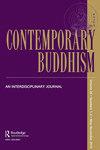THE BUDDHIST SOLDIER: A MADHYAMAKA INQUIRY
IF 0.1
3区 哲学
0 PHILOSOPHY
引用次数: 0
Abstract
ABSTRACT Dialogue between international humanitarian law (IHL) and Buddhism draws attention to the challenging question of the nature and identity of the Buddhist soldier. Here, the Buddhist soldier is considered not as a simple binary contradiction but as a complex dynamic paradox that can be unfolded, explored and understood through the use of Buddhist philosophy. The dialectical logic of Madhyamaka is harnessed through dialectical process analysis (DPA), a method that shows complex dynamic relationships in relatively accessible and legible spatial form, as maps. DPA maps are used to analyse the complex, dynamic nature of military duty, the soldier as responsible individual, and the soldier in socio-political context. Connections between the Mahāyāna Buddhist ideal of the bodhisattva and the Jungian Warrior Hero archetype are explored. A model is proposed for the ethical conduct of military operations in accordance with IHL, which includes the failure of ethics and law in the case of military atrocity. Ethics are discussed in both Buddhist and more general terms as ‘natural ethics’, for the critical test is not some parochial religious orthodoxy, but practical compliance with IHL in the field of conflict. Difficulties that the practice of ethical soldiering faces are noted. These will not be overcome without significant change, so implications are noted for management education, cultural change and organisational development in military training.佛教战士:一个宗教调查
国际人道主义法(IHL)和佛教之间的对话引起了人们对佛教士兵的性质和身份这一具有挑战性的问题的关注。在这里,佛教战士不是一个简单的二元矛盾,而是一个复杂的动态悖论,可以通过佛教哲学的运用来展开、探索和理解。Madhyamaka的辩证逻辑是通过辩证过程分析(DPA)来利用的,这是一种以相对可访问和可阅读的空间形式(如地图)显示复杂动态关系的方法。DPA地图用于分析军事职责的复杂、动态性质、士兵作为负责任的个人以及士兵在社会政治背景下的情况。探讨了禅宗的菩萨理想与荣格武士英雄原型之间的联系。根据《国际人道主义法》,提出了一个军事行动道德行为模式,其中包括在发生军事暴行时道德和法律的失误。伦理学在佛教和更普遍的术语中都被称为“自然伦理学”,因为关键的测试不是一些狭隘的宗教正统,而是在冲突领域实际遵守国际人道主义法。注意到道德士兵的做法所面临的困难。如果不进行重大变革,这些问题将无法解决,因此对军事训练中的管理教育、文化变革和组织发展都有影响。
本文章由计算机程序翻译,如有差异,请以英文原文为准。
求助全文
约1分钟内获得全文
求助全文

 求助内容:
求助内容: 应助结果提醒方式:
应助结果提醒方式:


